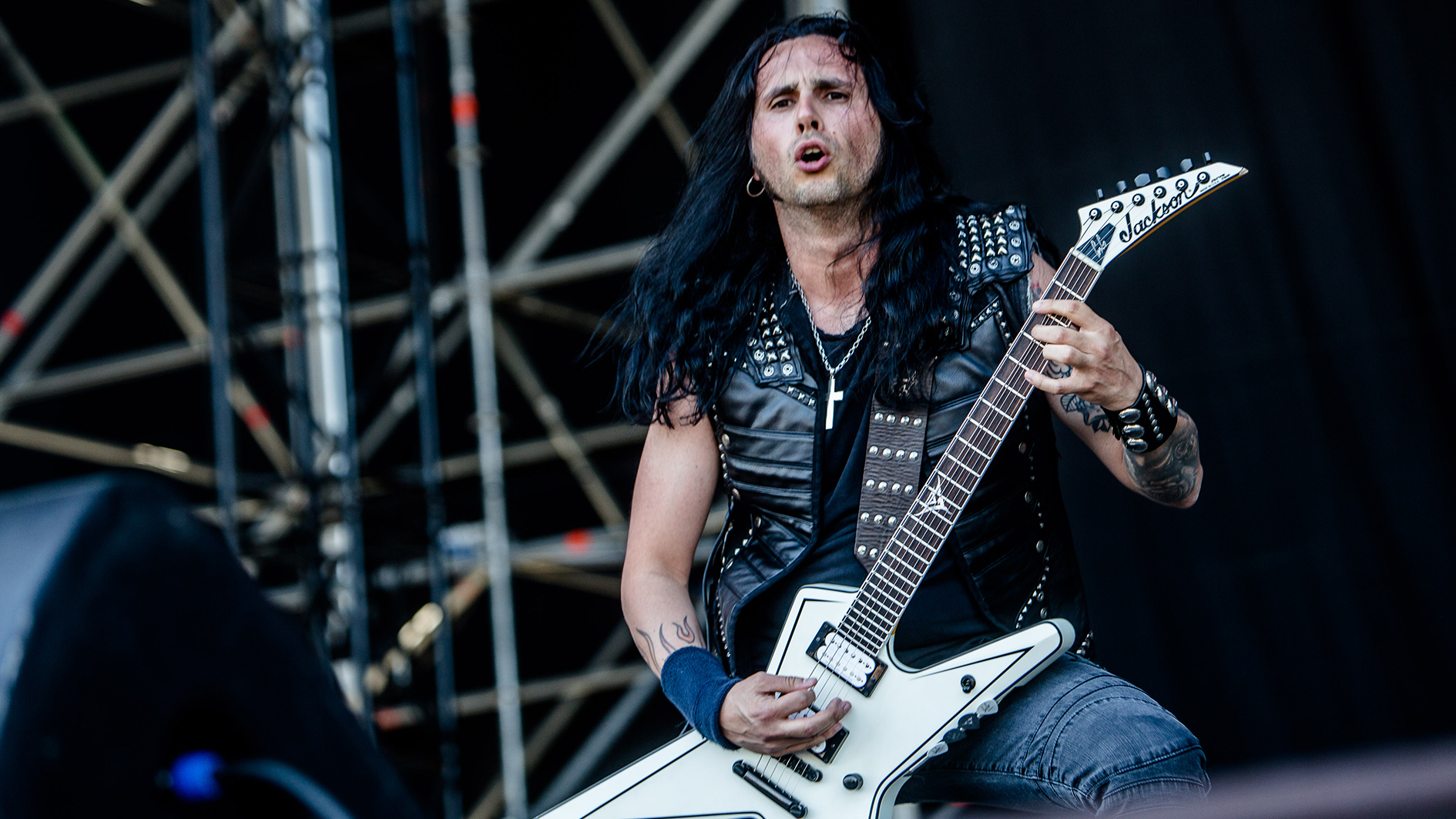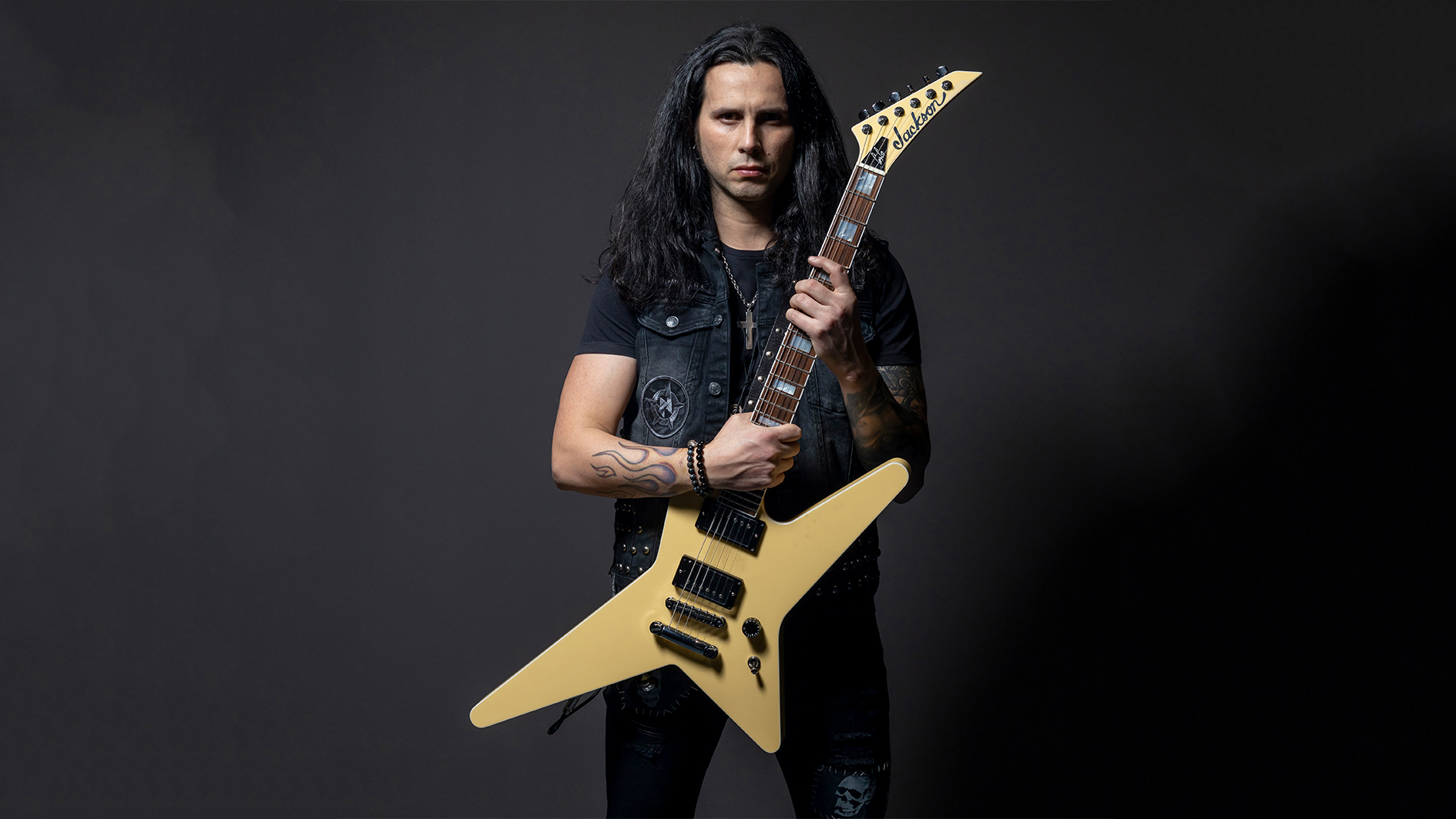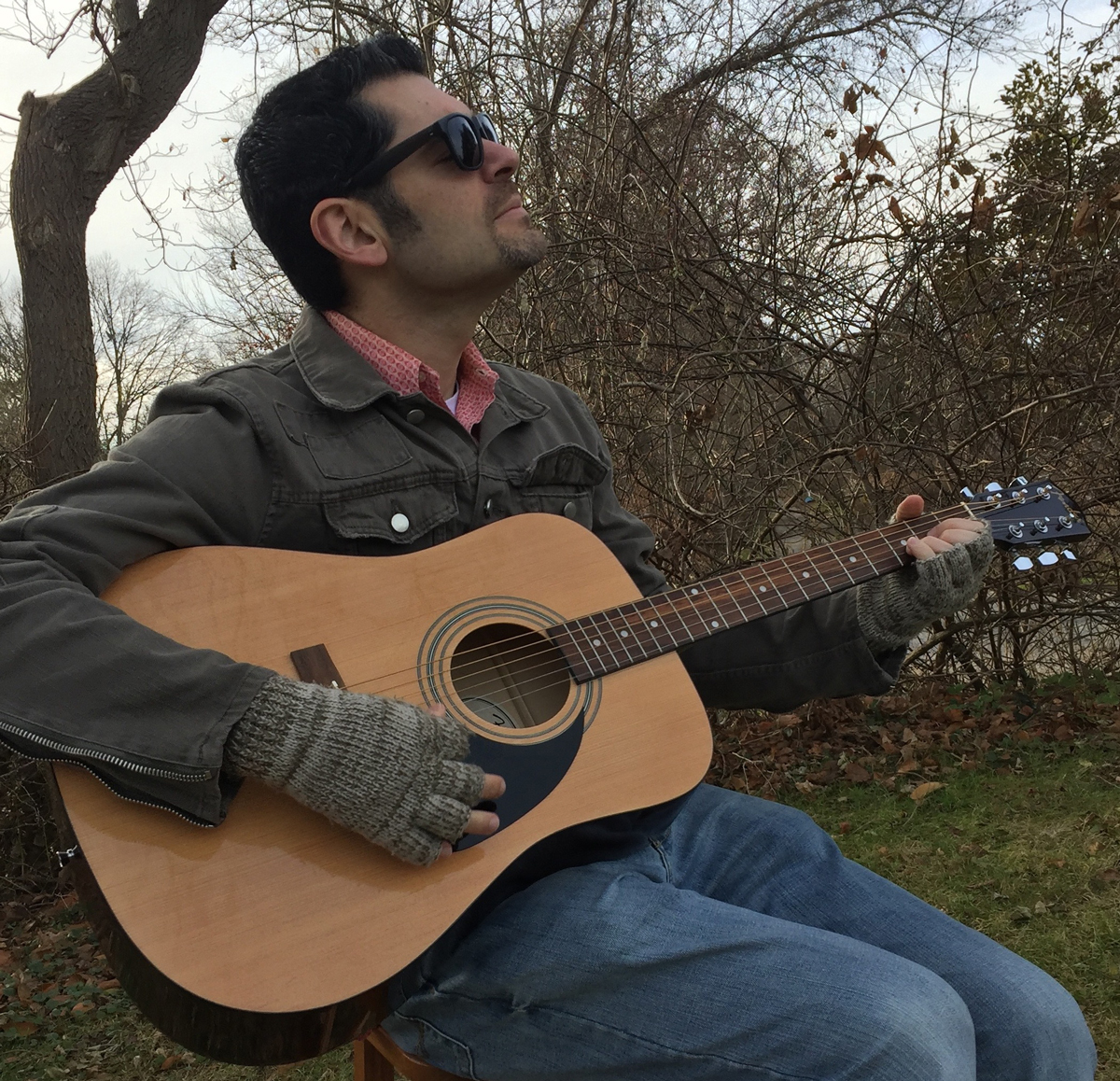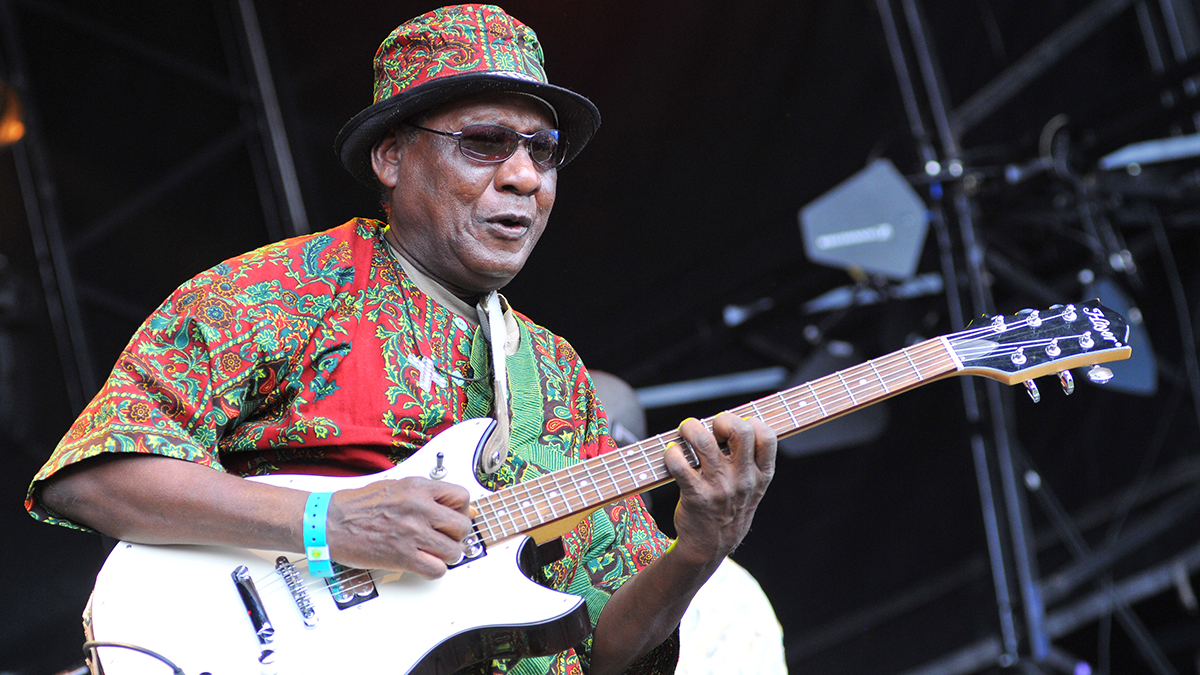Gus G on his first-ever all-instrumental solo record: “I wanted to avoid making a boring album that’s 45 minutes of ‘widdly widdly’!”
The Firewind guitarist on his forthcoming solo effort Quantum Leap, what sets his signature Jackson guitars apart, and how he entered (and exited) his gig with Ozzy Osbourne

All the latest guitar news, interviews, lessons, reviews, deals and more, direct to your inbox!
You are now subscribed
Your newsletter sign-up was successful
The list of guitarists Ozzy Osbourne has worked with throughout his career is second to none, including Tony Iommi, Randy Rhoads, Brad Gillis, Jake E. Lee and Zakk Wylde.
So, whenever the Prince of Darkness announces a new shredder in his line-up, headbangers certainly take note. And for his 2010 offering, Scream, that six-stringer was Gus G.
And although the Greek guitarist exited Ozzy's band in 2017, he has remained firmly in the spotlight, working both with power-metal band Firewind, and on his notable solo career, with which he is about to release his first-ever all-instrumental effort, Quantum Leap.
Gus spoke with Guitar World shortly before the arrival of his forthcoming solo LP.
Let’s start with your new album, Quantum Leap – what was the idea behind this record?
“The big difference to my previous solo records is that first of all, it’s instrumental – all-instrumental. So, there’s no singers – like in the past, I did collaborations with different singers.
“This is the first time I’m branching out to do a ‘full-on rock guitar record,’ so to speak. I’m doing a little bit more a stylistic exploration. Not really going too far away from the rock world, but there are a couple of different moments in there. And just the fact that the guitar is taking the lead role – the role of the singer.”
All the latest guitar news, interviews, lessons, reviews, deals and more, direct to your inbox!
How would you compare writing an all-instrumental song versus one that is going to have vocals?
“It was different. The original ideas were kind of in the same way that I had been writing, like in the first initial riffs. But later on, the way you develop instrumental ideas is quite different from a vocal song.
“Because in instrumental music, you have to fill up that space that the vocals are taking up. So, you can do that either with melodies, or it can be harmonies, or just different layers of musical parts or whatever. It’s like a whole new ballpark – it was interesting for me.
You’ve got to find a balance of keeping it interesting and melodic, and easy to listen to as much as possible
“I was always kind of scared of doing that, but I kind of decided, ‘I’m going to dive into this, and see how to do it.’ I mean, I’ve done instrumental songs in the past, but it usually was one song or two instrumental songs – within an album that had vocals all over it.
“For me, it was more of a matter of finding the balance between the melodies, the hooks, and to avoid making it a boring album that is 45 minutes full of ‘widdly widdly.’ [Laughs] You’ve got to find a balance of keeping it interesting and melodic, and easy to listen to as much as possible.
“And then of course, showcasing all the other things you can do as a guitar player here and there. But for me, it was not like an album to showcase my talent or my skill. I approached it from a songwriting point. But I also got a bit adventurous. I allowed myself to be a bit more adventurous with arrangements and things like that.”
Which solos are you most proud of on the album?
“It’s all one big solo! [Laughs] I’m just kidding – look, I’m proud of the whole thing.
“I think some of my lead work that stands out is probably a song called Chronesthesia – in the middle part, I’m trying to go into the ‘fusion world’. Even though I can’t really do that, I played all the out-of-key notes that I knew. It was something different and it was a cool, atmospheric part.
“I’m proud of the solo I did in The Enigma of Life – which is a more emotional type of song. At least in the feedback that I’m getting because it’s the latest single, people are really liking that one.
What was your guitar setup for the album?
“The instruments that I used were primarily my Jackson signature – my Star signature guitar, and my San Dimas. I used them both for rhythms and leads – depending on the song. One has passive pickups and one has active, so depending on the tones I was looking for, I looked for either setup. For the acoustic parts, I used a Washburn acoustic that I have… don’t ask me what model, I don’t know.
“I didn’t use any amps to record this. Because this whole thing was recorded during the lockdown period, I just did everything in my home studio, and it was convenient to record with plugins. And I used all kinds of plugins, because I tried out all types of stuff from different companies that sent me stuff.
“So, I used some presets from AmpliTube, IK Multimedia, Overloud TH-U, Toontrack, STL Tones. I know when we mixed it, some of the rhythm tones went through a 5150 III amp head – the Lunchbox. I think that was the only amp that was probably used on this. And then the rest was just plugin tones, basically.”
What makes your signature Jackson models unique?
“I guess with any signature instrument, it’s all about the choices of the specs. I’ve stuck to the kind of specs that I like for many, many years. I use alder body and a rosewood fretboard – that’s as far as the star-shaped guitar [the Pro Series Signature Gus G Star] goes.
The pandemic was a bit of a bummer for me, because the latest Firewind album really had momentum… it did well, even though we didn’t tour behind it. Our fans really dug that
“The San Dimas guitar has a brighter sound, because it’s a maple neck. And like I said, the San Dimas has passive pickups and the Star guitar has active pickups. I think that’s also one of the main differences there – which is my own pickup brand now.
“I have my own brand called Blackfire Pickups. Basically, I used both of the models [the Immortal and the Proteus] that my companies are offering.”
Also, let’s discuss Firewind’s self-titled release from 2020 – as it seemed to get lost due to the pandemic.
“Unfortunately, yeah. It was a bit of a bummer for me, because that album really had momentum… it did well, even though we didn’t tour behind it. Our fans really dug that.
“And it was a big change for the band – with a new singer, and going from a five-piece band to a four-piece. We were really looking forward to showcasing the new band and the new face of the band. And unfortunately, we still haven’t played live.
“But to me, the album still sounds killer – a year-and-a-half after it came out. Next year we are celebrating 20 years, so we are going to do a European tour and play a lot of the material from the self-titled record, but of course, do a ‘best of’ – with stuff from our whole discography.”
How did you get the gig with Ozzy?
“Somebody reached out from the management back then. They just emailed me and said, ‘Would you be interested in doing an audition?’ ‘Yeah, sure!’
“I learned a bunch of songs and they flew me out to LA, and we went into a rehearsal room. I got to meet everybody and we played for a couple of hours. Then Ozzy came in and we jammed for a bit. I think I got the gig on the spot – right there.
“He was like, ‘Yeah! You’re fucking great, man!’ They went into this other room and had a meeting really quickly – with Sharon [Osbourne], assistants, and whoever else was there – and they came back and said, ‘You did great. Would you like and come back and do a show with us?’ And I was like, ‘Hell yeah!’
Sharon called me at home to let me know I was no longer in Ozzy's band. I was kind of expecting it
“I think the first show was the BlizzCon Convention. That was probably like a ‘tryout show.’ And then they were like, ‘You did great. Do you want to come back and do another one?’ We did another festival, and then before I know it, I was over at his place, and he was playing me the new stuff he was working on, and I ended up staying there and recording the guitars for the album.”
Which Ozzy songs are you most proud of from a guitar standpoint?
“Obviously, the big song on that album was Let Me Hear You Scream – that was the big single and the big hit. I’m really proud of the guitar work on that one. I think 11 years later, it still sounds pretty cool. Diggin’ Me Down, as well. I really like that ballad, Time. There’s good guitar work all over that album.”
Which Ozzy songs were most fun to play live?
“For me, it was probably Bark at the Moon. I just love that one.”
How did you find out you were no longer in Ozzy’s band?
“Sharon called me at home. I was kind of expecting it. They had announced a festival, and I was waiting to hear back what was going to happen. And then eventually, she gave me a call – I think it was in the middle of the night, because we have such a time zone difference.”
“She called me in Greece, and said, ‘I just wanted to let you know personally, so you don’t find out online, we’re going to do the Farewell Tour, and Zakk is coming back for that.’ And I was like, ‘No worries at all. No problem.’ And I thanked her for everything they had done for me. We’re still on good terms, so, no problem at all.”

Would you ever consider working with Ozzy again?
“I think that’s more of a question that you have to ask him. [Laughs] It’s pretty obvious, I wouldn’t say no if he called me up and wanted to play a show or for an album. I loved my time with him, and of course I would do it again.”
“I think it’s more of a question for him – because he gets to pick and choose who he works with. I don’t think there is a guitar player on earth that would turn that down…or maybe there would be, I don’t know.” [Laughs]
What are your future plans?
“Maybe play some shows for a change. I’m focusing on getting Firewind together for that 20th anniversary tour next year. I’m probably going to do some more writing. Working on my own pickup company. So, there’s a lot of stuff that I’ve got my hands on.”
- Quantum Leap is out on October 8 and available to preorder now.
Greg is a contributing writer at Guitar World. He has written for other outlets over the years, and has been lucky to interview some of his favorite all-time guitarists and bassists: Tony Iommi, Ace Frehley, Adrian Belew, Andy Summers, East Bay Ray, Billy Corgan, Alex Lifeson, Geddy Lee, Les Claypool, and Mike Watt, among others (and even took lessons from John Petrucci back in the summer of ’91!). He is the author of such books as Grunge Is Dead: The Oral History of Seattle Rock Music, Shredders: The Oral History of Speed Guitar (And More) and Touched by Magic: The Tommy Bolin Story.

